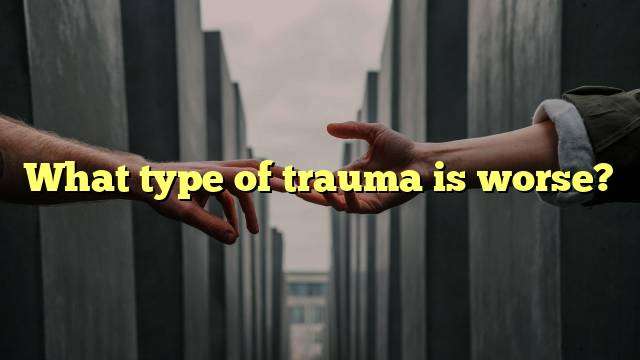What Type of Trauma is Worse?
When it comes to trauma, there is no single definition that applies to everybody’s experience. Trauma is a very personal experience and the reactions to it can vary greatly from person to person. People can experience different types of trauma and each individual’s response to it can be unique. While there is no one type of trauma that is necessarily “worse” than another, it is important to recognize the effects that trauma can have on a person’s life.
When it comes to understanding different types of trauma, it can be helpful to think about “big T” trauma and “little t” trauma. Big T trauma is the type of trauma that usually comes to mind when we think about the term. This type of trauma is generally more intense, often acute, and can involve a single event or a series of events that lead to a lasting psychological impact. Examples of big T trauma can include physical or sexual abuse, witnessing a violent crime, or experiencing a natural disaster.
Little t trauma, on the other hand, is often more subtle and can be cumulative in nature. This type of trauma is often experienced over a long period of time and can involve experiences such as growing up in a dysfunctional family, experiencing chronic neglect or bullying, or living in an environment of persistent fear or insecurity. While the effects of big T trauma can be more immediate and acute, the effects of little t trauma can be more subtle and may be harder to recognize or acknowledge.
It is important to recognize that, no matter the type of trauma, it is still traumatic and can have a lasting impact on a person’s mental health. The effects of trauma can manifest in a variety of ways, including physical symptoms such as headaches or stomachaches, difficulty sleeping, and feelings of anxiety or depression. It is also important to recognize that everyone experiences trauma differently and that it is normal to have a range of reactions to it. It is important to seek help if you are experiencing trauma and to find ways to cope with it in a healthy way.
Trauma is not a competition, and it is important to recognize that no one type of trauma is “worse” than another. It is important to be mindful of the effects that trauma can have on a person’s life, regardless of the type of trauma they have experienced.
It is also important to recognize that trauma can be experienced in many different forms and that it can have a lasting impact on a person’s mental health. It is important to seek help if you are experiencing trauma and to find ways to cope with it in a healthy way. It is also important to practice self-care and to find support from family, friends, or professionals if needed.
At the end of the day, it is important to remember that everyone’s experience with trauma is unique and valid. If something hurts you, it is valid. Everyone’s experience with trauma is important and needs to be respected. It is important to recognize that trauma can take many forms and can have a lasting impact on a person’s mental health. It is important to seek help if you are experiencing trauma and to find ways to cope with it in a healthy way.



